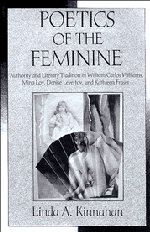 Poetics of the Feminine
Poetics of the Feminine Book contents
- Frontmatter
- Contents
- Acknowledgments
- Introduction
- 1 “The Full of My Freed Voice”: Williams and Loy, Feminism and the Feminine
- 2 In The American Grain: Proclaiming a Feminine Ground
- 3 Denise Levertov: The Daughter's Voice
- 4 Kathleen Fraser: A Tradition of Marginality
- Conclusion: Paterson and the Question of Authority
- Notes
- Bibliography
- Index
- CAMBRIDGE STUDIES IN AMERICAN LITERATURE AND CULTURE
4 - Kathleen Fraser: A Tradition of Marginality
A Tradition of Marginality
Published online by Cambridge University Press: 08 January 2010
- Frontmatter
- Contents
- Acknowledgments
- Introduction
- 1 “The Full of My Freed Voice”: Williams and Loy, Feminism and the Feminine
- 2 In The American Grain: Proclaiming a Feminine Ground
- 3 Denise Levertov: The Daughter's Voice
- 4 Kathleen Fraser: A Tradition of Marginality
- Conclusion: Paterson and the Question of Authority
- Notes
- Bibliography
- Index
- CAMBRIDGE STUDIES IN AMERICAN LITERATURE AND CULTURE
Summary
Breaking rules, breaking boundaries, crossing over, going where you've been told not to go has increasingly figured in the writing of the contemporary woman poet as a natural consequence of the restraints placed upon her as a child being socialized to the female role her class and culture prefer. The poem becomes her place to break rank: her words, her line lengths and placements, her “stuff”.
– Kathleen FraserThe chosen daughter of an acknowledged American tradition of modern poetry, Denise Levertov writes directly out of a male-dominated line. Nonetheless, she imagines the unexperienced fullness to come when the daughters write from their mothers. A generation after Levertov's entry into an American tradition, Kathleen Fraser and other experimental women writers actively began seeking out their literary mothers, a project giving rise to many questions concerning a tradition of poetic fathers.
This tradition, as experienced by contemporary writers, extends to and sustains the poetic world of the present. Associated in her early career with Frank O'Hara's New York School, Fraser quickly became sensitized to the exclusion of women (such as Barbara Guest) from serious treatments, anthologies, and groupings of that movement, whether by critics or by the poets themselves.
- Type
- Chapter
- Information
- Poetics of the FeminineAuthority and Literary Tradition in William Carlos Williams, Mina Loy, Denise Levertov, and Kathleen Fraser, pp. 183 - 236Publisher: Cambridge University PressPrint publication year: 1994
